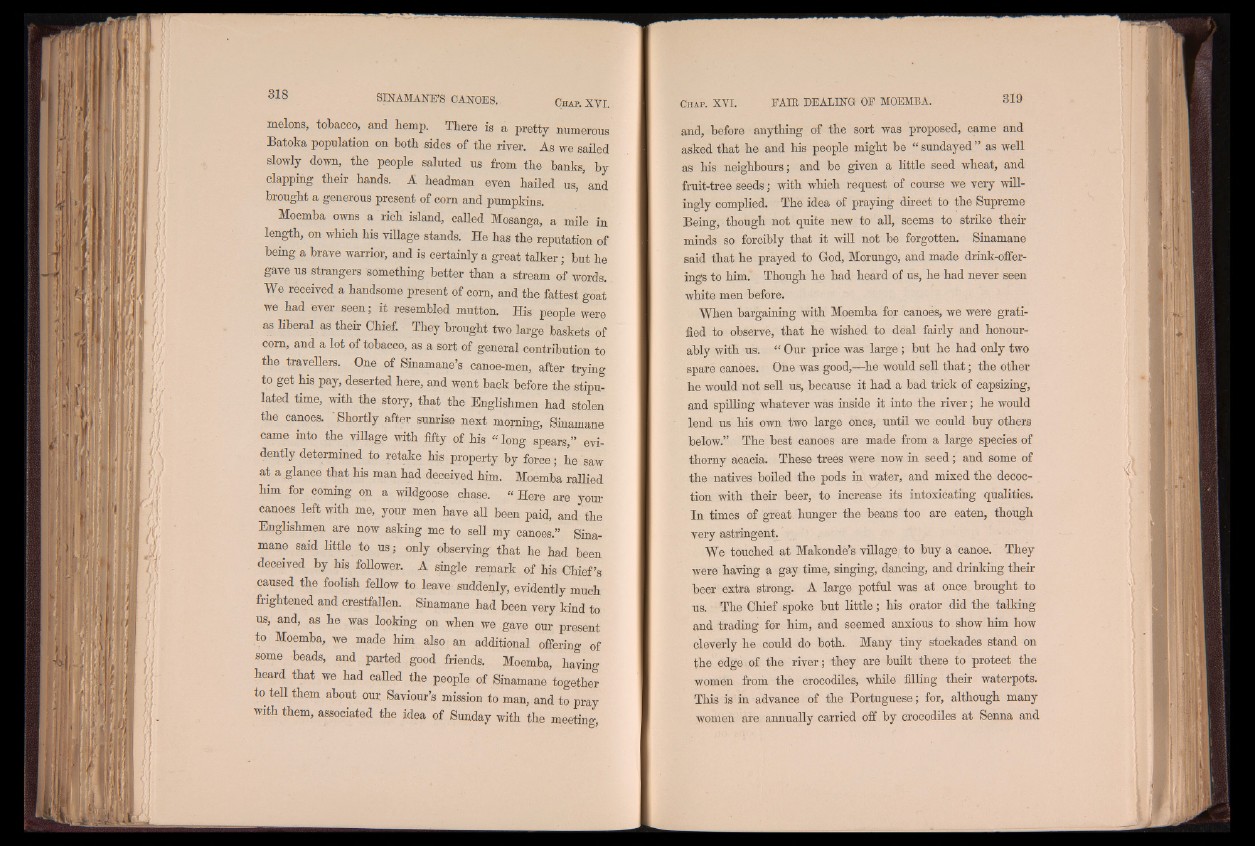
melons, tobacco, and hemp. There is a pretty numerous
Batoka population on both sides of the river. As we sailed
slowly down, the people saluted us from the banks, by
clapping their hands. A headman even hailed u s /a n d
brought a generous present of com and pumpkins.
Moemba owns a rich island, called Mosanga, a mile in
length, on which his village stands. He has the reputation of
being a brave warrior, and is certainly a great talker; but he
gave us strangers something better than a stream of words.
We received a handsome present of com, and the fattest goat
we had ever seen; it resembled mutton. His people were
as liberal as their Chief. They brought two large baskets of
com, and a lot of tobacco, as a sort of general contribution to
the travellers. One of Sinamane’s canoe-men, after trying
to get his pay, deserted here, and went back before the stipulated
time, with the story, that the Englishmen had stolen
the canoes. ‘Shortly after sunrise next morning, Sinamane
came into the village with fifty of his “ long spears,” evidently
determined to retake his property by force; he saw
at a glance that his man had deceived him. Moemba rallied
him for coming on a wildgoose chase. “ Here are your
canoes left with me, your men have all been paid, and the
Englishmen are now asking me to sell my canoes.” Sinamane
said little to us; only observing that he had been
deceived by his follower. A single remark of his Chief’s
caused the foolish fellow to leave suddenly, evidently much
frightened and crestfallen. Sinamane had been very kind to
us, and, as he was looking on when we gave our present
to Moemba, we made him also an additional offering of
some beads, and parted good friends. Moemba, having
heard that we had called the people of Sinamane together
to tell them about our Saviour’s mission to man, and to pray
with them, associated the idea of Sunday with the meeting,
and, before anything of the sort was proposed, came and
asked that he and his people might be | sundayed ” as well
as his neighbours; and be given a little seed wheat, and
fruit-tree seeds; with which request of course we very willingly
complied. The idea of praying direct to the Supreme
Being, though not quite new to all, seems to strike their
minds so forcibly that it will not be forgotten. Sinamane
said that he prayed to God, Morungo, and made drink-offerings
to him. Though he had heard of us, he had never seen
white men before.
When bargaining with Moemba for canoes, we were gratified
to observe, that he wished to deal fairly and honourably
with us. “ Our price was large ; but he had only two
spare canoes. One was good,—he would sell th a t; the other
he would not sell us, because it had a bad trick of capsizing,
and spilling whatever was inside it into the river; he would
lend us his own two large ones, until we could buy others
below.” The best canoes are made from a large species of
thorny acacia. These trees were now in seed; and some of
the natives boiled the pods in water, and mixed the decoction
with their beer, to increase its intoxicating qualities.
In times of great hunger the beans too are eaten, though
very astringent.
We touched at Makonde’s village to buy a canoe. They
were having a gay time, singing, dancing, and drinking their
beer extra strong. A large potful was at once brought to
us. The Chief spoke but little ; his orator did the talking
and trading for him, and seemed anxious to show him how
cleverly he could do both. Many tiny stockades stand on
the edge of the river; they are built there to protect the
women from the crocodiles, while filling their waterpots.
This is in advance of the Portuguese; for, although many
women are annually carried off by crocodiles at Senna and